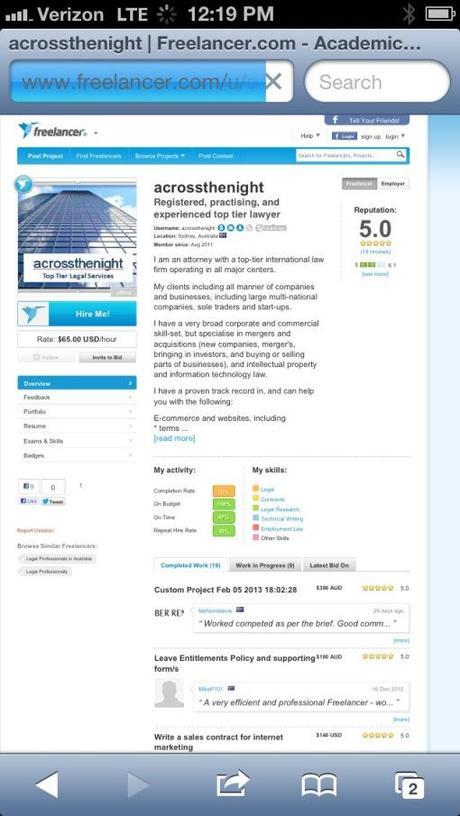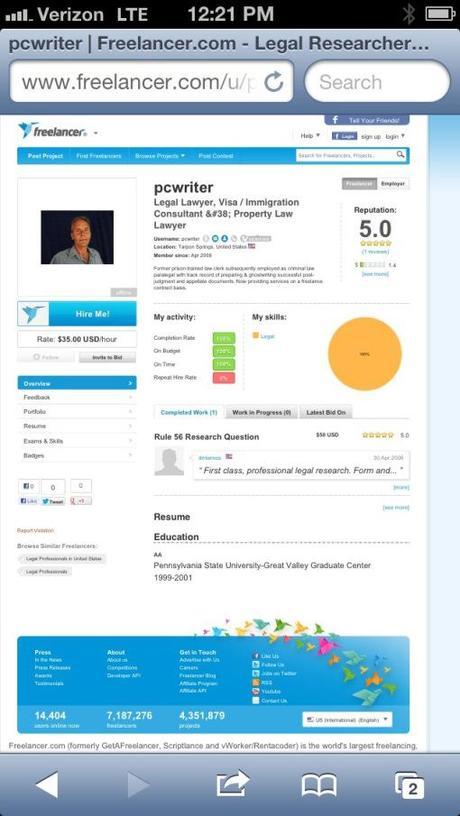The Great Recession forced a lot of previously employed journalists, graphic designers and word processors to start freelancing, and websites such as Freelancer.com and Elance.com have cropped up to help match service providers with service needers.
The past couple of years have been pretty tough for lawyers, too, and not just for recent graduates. The local legal paper always has one or two classifieds advertising the availability of an unnamed lawyer to perform legal research or brief drafting for other lawyers on an hourly basis.
You might not have realized, though, that legal services may also be bought and paid for via freelancing websites, and it doesn’t look like all of the advertisers are actually lawyers.
Purely by way of example, I decided to search at http://www.Freelancer.com. I selected “Business, Accounting, Human Resources & Legal” from the menu on the left of the page, then narrowed my choice to “Legal.” First up on the list of results was “acrossthenight,” who describes himself as “an attorney with a top-tier international law firm” in Sydney, Australia.
His hourly rate is on the high end for the results I received at $65.00 an hour. “Acrossthenight” provides services including e-commerce, software licenses and agreements, business sales, investment transactions and patent applications. I suppose this is fine so long as “acrossthenight”‘s firm knows he is providing these services, but I tend to suspect that either they don’t, or that “acrossthenight” is no longer employed with the firm and is trying to make ends meet in the interim. Either way, there may be ethical concerns; generally speaking, an attorney isn’t supposed to represent clients outside and separate from his firm without the firm’s knowledge and consent, and if he is not actually employed with a major firm his profile is materially misleading. Since “abovethenight” is in Australia that country’s ethical rules would apply, and I don’t pretend to know what they provide. But if they are similar to our ethical rules in the United States, I have some concerns.
More troubling, however, are the profiles that fall lower on the list of results. Profiles seem to be ranked based upon an algorithm determined from a freelancer’s skills, number of projects completed, and positive feedback. Towards the end of my results was this profile by “pcwriter:”
“Pcwriter” is a “former prison-trained law clerk subsequently employed as criminal law paralegal with track record of preparing & ghostwriting successful post-judgment and appellate documents.” However, the title of “pcwriter”‘s profile is “Legal Lawyer, Visa/Immigration Consultant; Property Law Lawyer.” In case you were wondering if “pcwriter” had obtained his law degree after prison, it doesn’t look like it: the only degree appearing in the Resume/Education section is an Associate’s Degree obtained in 2001.
I guess my point in writing this is not to call out anyone providing freelance legal services, but to question whether, in our rush to provide quick, unbundled, “virtual” legal services we’ve gone too far. “Pcwriter” only charges $35.00 an hour, compared to other freelancers charging closer to $100.00 an hour, and lawyers in private practice who charge between $100.00 and $ 1,000.00 an hour. Someone who needs a deed drafted, for example, or assistance with an immigration proceeding will be sorely tempted to choose the cheaper service. And maybe everything will work out fine. But I do wonder, if things don’t go well, what will happen, and not only to the unhappy client, but to the reputation of the bar in general. Is there a way to provide the responsiveness and economy typified by a freelancing arrangement without discarding the attorney-client relationship altogether?
We should work on that.


